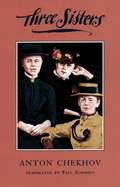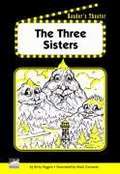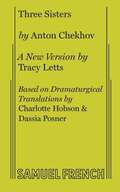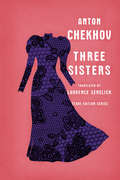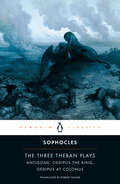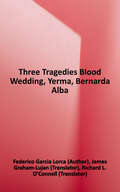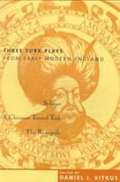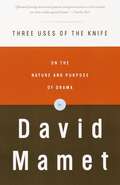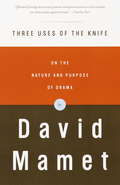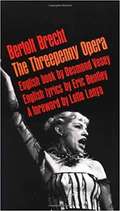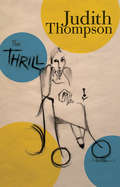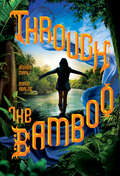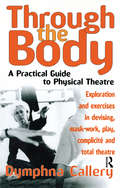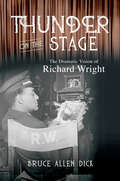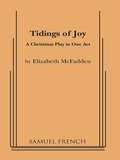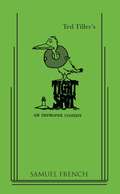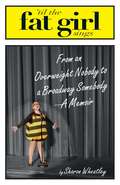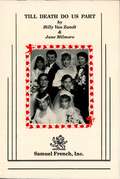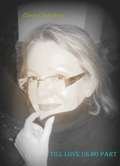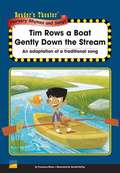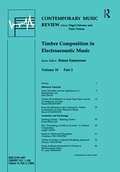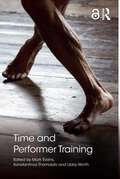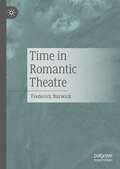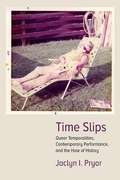- Table View
- List View
Three Sisters
by Anton Chekhov Paul SchmidtThis refreshingly clear and colloquial adaptation was the basis for the Wooster Group's acclaimed production Brace Up!
The Three Sisters
by Kitty Higgins Anne Flounders Mark CorcoranPerform this script about the eruption of a long-dormant volcano and the earthquake that followed the eruption.
Three Sisters
by Tracy Letts Anton ChekovThe Prozorov sisters pine for Moscow. Culture and life brim in the city center, while they live among the mundane of a crumbling army garrison after their father's death. Though living with their brother Andrey, nothing keeps them back but their own misfortune, decisions, and the inertia of negativity that continues to follow this family.
Three Sisters
by Laurence Senelick Anton Chekhov"Senelick's accomplishment is astounding."--Library Journal Anton Chekhov is a unique force in modern drama, his works cherished for their brilliant wit and insight into the human condition. In this stunning new translation of one of Chekhov's most popular and beloved plays, Laurence Senelick presents a fresh perspective on the master playwright and his groundbreaking dramas. He brings this timeless trial of art and love to life as memorable characters have clashing desires and lose balance in the shifting eruptions of society and a modernizing Russia. Supplementing the play is an account of Chekhov's life; a note on the translation; an introduction to the work; and variant lines, often removed due to government censorship, which illuminate the context in which they were written. This edition is the perfect guide to enriching our understanding of this great dramatist or to staging a production.
Three Tall Women
by Edward AlbeeAlbee’s frank dialogue about everything from incontinence to infidelity portrays aging without sentimentality. His scenes are charged with wit, pain, and laughter, and his observations tell us about forgiveness, reconciliation, and our own fates. But it is his probing portrait of the three women that reveals Albee’s genius.
The Three Theban Plays: Antigone; Oedipus the King; Oedipus at Colonus
by Bernard Knox Robert Fagles SophoclesThe heroic Greek dramas that have moved theatergoers and readers since the fifth century B.C.Towering over the rest of Greek tragedy, the three plays that tell the story of the fated Theban royal family—Antigone, Oedipus the King and Oedipus at Colonus—are among the most enduring and timeless dramas ever written. Robert Fagles's authoritative and acclaimed translation conveys all of Sophocles's lucidity and power: the cut and thrust of his dialogue, his ironic edge, the surge and majesty of his choruses and, above all, the agonies and triumphs of his characters. This Penguin Classics edition features an introduction and notes by the renowned classicist Bernard Knox.For more than seventy years, Penguin has been the leading publisher of classic literature in the English-speaking world. With more than 1,700 titles, Penguin Classics represents a global bookshelf of the best works throughout history and across genres and disciplines. Readers trust the series to provide authoritative texts enhanced by introductions and notes by distinguished scholars and contemporary authors, as well as up-to-date translations by award-winning translators.
Three Tragedies: Blood Wedding, Yerma, Bernarda Alba
by Federico Garcia LorcaHere in the authorized translation by James Graham-Luján and Richard L. O’Connell, with an illuminating biographical introduction by the poet’s brother, Francisco García Lorca, are three tragic dramas by the great modern Spanish poet and playwright which have caught the imagination and won the critical acclaim of the literate world. <p><p>Blood Wedding. Concerned with love that cannot become marriage among the primitive hill people of Castile, this is a play of the workings of tremendous passions and tribal ritual toward an inescapable tragic end. Yerma. "The whole tragic burden of Yerma is measured by the deepening of her struggle with the problem of frustrated motherhood." -From García Lorca, by Edwin Honig. The House of Bernarda Alba. Again in "Women Who Love Moves to Tragedy," Bernarda Alba tells of the repression of five daughters by a domineering mother, of how their natural spirits circumvent her but bring violence and death.
Three Turk Plays from Early Modern England: Selimus, A Christian Turned Turk, and The Renegado
by Robert Greene Robert Daborne Philip Massinger Daniel J. VitkusDuring the sixteenth and seventeenth centuries, the Ottoman empire posed a clear and present danger to Christian rule in Europe. While English commerce with the Mediterranean world expanded, Ottoman forces invaded Greece, Hungary, and Austria. At the same time, "Turkish" pirates and renegades from North Africa roamed the Atlantic and raided the coast of England. The threat was ideological as well: English sailors captured by Barbary pirates sometimes renounced their faith and converted to Islam. Here, three important early modern "Turk" plays―Robert Greene's Selimus, Emperor of the Turks (1594); Robert Daborne's A Christian Turned Turk (1612); and Philip Massinger's The Renegado (1623)―are available for the first time. These texts represent Islamic power and wealth in scenes of piracy on the high seas, on-stage execution by strangulation, and rites of religious conversion. The plays are set in historical and cultural context by Daniel J. Vitkus's clear and thoughtful introduction. These carefully edited, annotated, modern-spelling editions are particularly valuable for understanding the cultural production of English identity in relation to the Islamic Other.
Three Uses of the Knife: On the Nature and Purpose of Drama
by David MametMamet unravels the infamous "Second-Act Problem," considers the mysterious persistence of the soliloquy. Three Uses of the Knife is an inspired guide for any playwright that doubles as a trenchant work of aesthetic philosophy.
Three Uses of the Knife
by David MametThe purpose of theater, like magic like religion...ids to inspire cleansing awe. With bracing directness and aphoristic authority, one of our greatest living playwrights addresses the questions: What makes good drama? And why does drama matter in an age that is awash in information and entertainment? David Mamet believes that the tendency to dramatize is essential to human nature, that we create drama out of everything from today's weather to next year's elections. But the highest expression of this drive remains the theater. With a cultural range that encompasses Shakespeare, Bretcht, and Ibsen, Death of a Salesman and Bad Day at Black Rock, Mamet shows us how to distinguish true drama from its false variants. He considers the impossibly difficult progression between one act and the next and the mysterious function of the soliloquy. The result, in Three Uses of the Knife, is an electrifying treatise on the playwright's art that is also a strikingly original work of moral and aesthetic philosophy.
The Threepenny Opera
by Bertolt Brecht Norman Roessler John Willett Ralph Manheim Nadine GordimerBased on John Gay's eighteenth century Beggar's Opera, The Threepenny Opera, first staged in 1928 at the Theater am Schiffbauerdamm in Berlin, is a vicious satire on the bourgeois capitalist society of the Weimar Republic, but set in a mock-Victorian Soho. With Kurt Weill's unforgettable music - one of the earliest and most successful attempts to introduce jazz to the theatre - it became a popular hit throughout the western world. <p><p> Published in Methuen Drama's Modern Classics series, this edition features extensive notes and commentary including an introduction to the play, Brecht's own notes on the play, a full appendix of textual variants, a note by composer Kurt Weill, a transcript of a discussion about the play between Brecht and a theatre director, plus editorial notes on the genesis of the play.
The Thrill
by Judith ThompsonElora Dixon is a vibrant, middle-aged lawyer and disability-rights activist who has never walked a step in her life. A neuromuscular disease left her with a curved spine and a reliance on around-the-clock care. Nonetheless, she is an inexorable force when chance pits her against the notorious Julian Summer, who is in town promoting his internationally bestselling book. Julian is a fervent supporter of euthanasia, and Elora is the counter-argument—a living rebuke to parents who want the option of euthanizing a disabled newborn. So it comes as a shock, especially to Elora, when the two find themselves acutely attracted to one another. Will she learn to negotiate her feelings and her convictions, or will Julian’s beliefs begin to colour her own?
Through the Bamboo
by Andrea Mapili Byron AbalosTwelve-year-old Philly is literally pulled into an action-packed adventure while mourning the loss of her lola when she opens an old book and finds herself tossed into the fantastical land of Uwi. In Uwi, memories are stories, and all stories are forbidden since the datu’s storytelling-loving wife died and his youngest daughter Nale disappeared. Now his remaining daughters, the Sisters, rule with darkness in their hearts. So when Philly appears, the duwende believe that she is Nale and the key to saving Uwi. Can Philly save them all while searching for her lola to bring her back home? Similar to The Wizard of Oz, the Chronicles of Narnia, and Alice in Wonderland, this unique Filipinx-Canadian tale inspired by Philippine mythology shows the value of keeping memories alive and explores how families deal with loss.
Through the Body: A Practical Guide to Physical Theatre
by Dymphna CalleryIn Through the Body, Dymphna Callery introduces the reader to the principles behind the work of key practitioners of 20th-century theater including Artaud, Grotowski, Brook and Lecoq. She offers exercises that turn their theories into practice and explore their principles in action.
Thunder on the Stage: The Dramatic Vision of Richard Wright
by Bruce Allen DickRichard Wright’s dramatic imagination guided the creation of his masterpieces Native Son and Black Boy and helped shape Wright’s long-overlooked writing for theater and other performative mediums. Drawing on decades of research and interviews with Wright’s family and Wright scholars, Bruce Allen Dick uncovers the theatrical influence on Wright’s oeuvre--from his 1930s boxing journalism to his unpublished one-acts on returning Black GIs in WWII to his unproduced pageant honoring Vladimir Lenin. Wright maintained rewarding associations with playwrights, writers, and actors such as Langston Hughes, Theodore Ward, Paul Robeson, and Lillian Hellman, and took particular inspiration from French literary figures like Jean-Paul Sartre. Dick’s analysis also illuminates Wright’s direct involvement with theater and film, including the performative aspects of his travel writings; the Orson Welles-directed Native Son on Broadway; his acting debut in Native Son’s first film version; and his play “Daddy Goodness,” a satire of religious charlatans like Father Divine, in the 1930s. Bold and original, Thunder on the Stage offers a groundbreaking reinterpretation of a major American writer.
Tidings of Joy
by Elizabeth McfaddenShort Christmas drama \ 10 boys, 6 girls, extras \ Int. \ A young couple, faced with eviction from their home on Christmas Eve, is befriended by a group of boys and girls from the neighboring church. There is a plea for charity at the Christmas season and a reminder that any home that shelters a baby shares the august beauty of the Nativity story. A beautiful Christmas story that charmingly combines modern characters with the Bible.
Tight Spot
by Ted TillerAn Improper Comedy / 3m, 3f / Interior Set / Anyone nutty enough to buy an old lighthouse for a summer home is looking for trouble. It comes on the double to a novelist, her estranged TV film star husband and the latest gleam in his roving eye when this unsociable triangle, along with the novelist's globetrotting journalist mother, a baffled editor and a grocery boy find themselves trapped on the top floor during the off season. Suspense spirals and comedy crackles during three days of confinement.
Til The Fat Girl Sings: From an Overweight Nobody to a Broadway Somebody-A Memoir
by Sharon WheatleyA Simon & Schuster eBook. Simon & Schuster has a great book for every reader.
Till Death Do Us Part
by Jane Milmore Billy Van ZandtFarce / 6m, 5f / 2 Interiors / This delightful look at modern marriage in all its marred majesty had them rolling in the aisles at its premier in New Jersey. Narrated by a jaded bachelor who knows the bloom inevitably leaves the rose, the play opens with a pristine view of marriage: a wedding album slide show of the weddings of four happy couples. The images are quickly supplanted by the reality of the couples' eroding relationships. By the time all four couples repair to a Vermont country inn, their marriages are in an advanced state of disrepair. There doesn't seem to be a happy ending in sight, but the ending is full of surprises. The dialogue is sprinkled liberally with hilarious gags in this comedy about the dark side of marriage.
Till Love Us Do Part
by Elena Chernikova Kamilya SalibayevaElena Chernikova’s lyrical drama "Till Love Us Do Part" is acute in the way of thinking. In this play, love is the lifelong drama for all the characters.
Tim Rows a Boat Gently Down the Stream: An Adaptation of a Traditional Song
by Francisco BlaneNIMAC-sourced textbook
Timbre Composition in Electroacoustic Music (Contemporary Music Review #10.2)
by Simon EmmersonFirst Published in 1994. The contributions to this collection have been selected to define a range of interests from the technical, aesthetic, cognitive and compositional spheres. The book addresses the continuing need for musicologists, psychologists, composers and listeners to enter into a creative dialogue with designers and builders, who are usually programmers in the contemporary world. The collection as a whole will help to demonstrate the great potential for exchange between the multidisciplinary approaches to music.
Time and Performer Training
by Mark Evans Konstantinos Thomaidis Libby WorthTime and Performer Training addresses the importance and centrality of time and temporality to the practices, processes and conceptual thinking of performer training. Notions of time are embedded in almost every aspect of performer training, and so contributors to this book look at: age/aging and children in the training context how training impacts over a lifetime the duration of training and the impact of training regimes over time concepts of timing and the ‘right’ time how time is viewed from a range of international training perspectives collectives, ensembles and fashions in training, their decay or endurance. Through focusing on time and the temporal in performer training, this book offers innovative ways of integrating research into studio practices. It also steps out beyond the more traditional places of training to open up time in relation to contested training practices that take place online, in festival spaces and in folk or amateur practices. Ideal for both instructors and students, each section of this well-illustrated book follows a thematic structure and includes full-length chapters alongside shorter provocations. Featuring contributions from an international range of authors who draw on their backgrounds as artists, scholars and teachers, Time and Performer Training is a major step in our understanding of how time affects the preparation for performance.
Time in Romantic Theatre
by Frederick BurwickThe shift in temporal modalities of Romantic Theatre was the consequence of internal as well as external developments: internally, the playwright was liberated from the old imperative of “Unity of Time” and the expectation that the events of the play must not exceed the hours of a single day; externally, the new social and cultural conformance to the time-keeping schedules of labour and business that had become more urgent with the industrial revolution. In reviewing the theatre of the Romantic era, this monograph draws attention to the ways in which theatre reflected the pervasive impact of increased temporal urgency in social and cultural behaviour. The contribution this book makes to the study of drama in the early nineteenth century is a renewed emphasis on time as a prominent element in Romantic dramaturgy, and a reappraisal of the extensive experimentation on how time functioned.
Time Slips: Queer Temporalities, Contemporary Performance, and the Hole of History
by Jaclyn I. PryorPryor illuminates how each artist deploys performance as a tool to render history visible, trauma recognizable, and transformation possible by laying bare the histories and ongoing systems of violence woven deep into our society.
